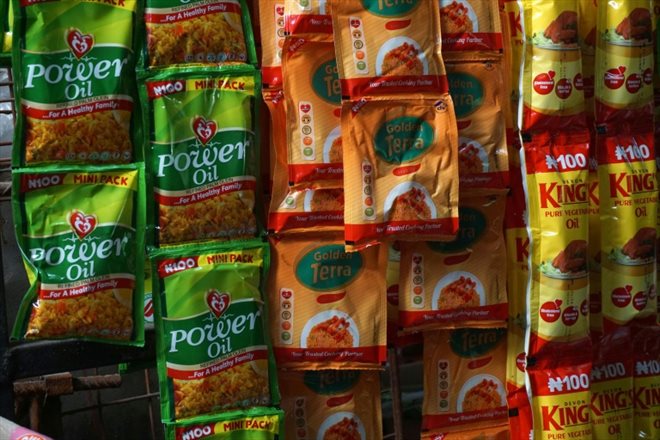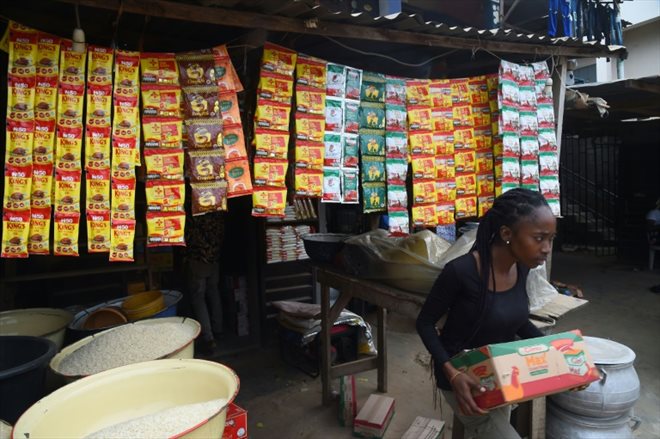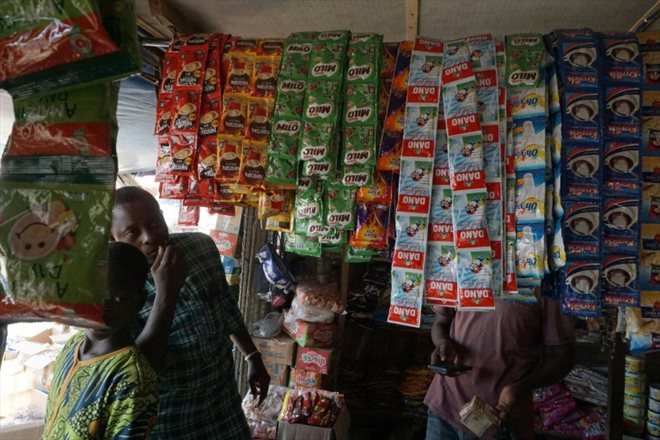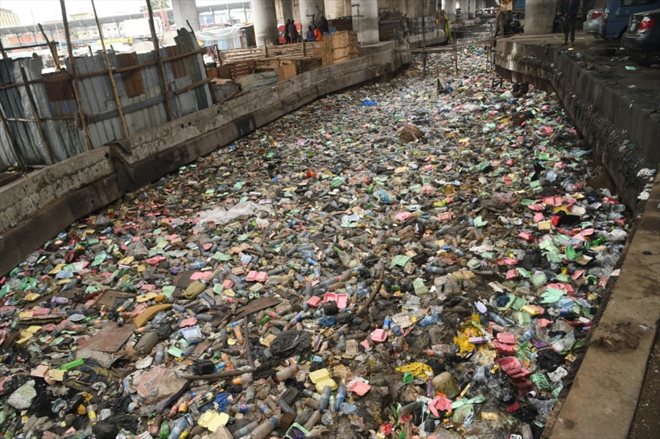Sachets of basic necessities sold in Ibafo market, Ogun state, on July 28, 2022 in Nigeria (AFP/PIUS UTOMI EKPEI)
Five grams of toothpaste or ten centiliters of cooking oil: strangled by the cost of living, Nigerians now buy their basic necessities in small quantities, packed in tiny plastic bags, to be consumed during the day.
The big brands at the origin of this “sachetisation of the economy”, see it as an “innovation”, allowing access to consumption for all Nigerians, the majority of whom survive from day to day. For others, it is an economic and ecological aberration.
In the streets of Lagos, the vibrant economic capital of Africa’s most populous country, sachets have become part of the decor: they color its streets, streaking the thousands of wood and sheet metal shops that can be found everywhere.
Sitting on a stool, Ibrahim Atahire has been running one of these small grocery stores for 30 years in a busy lane of Obalende, a working-class district. The 55-year-old man with the graying beard assures him: “At my place, you can buy everything in small quantities”.
And that’s true. On its stand, everything is sold in sachets: coffee or powdered milk for just one cup, a few grams of cereal for a bowl, toothpaste for brushing your teeth, razors wrapped and sold individually, powder detergent for a single wash.
Even the mosquito repellent cream to relieve bites is sold in a plastic package smaller than the palm of your hand.

Sachets of cooking oil for sale at Ibafo market in Ogun state on July 28, 2022 in Nigeria (AFP/PIUS UTOMI EKPEI)
For lunch, cooking oil can also be purchased in sachets, as are spices and tomato sauce. One sachet, for each ingredient and for each meal.
“For years I have offered sachets for sale, but recently people can no longer afford to buy in normal quantities, so I sell more than that,” explains the seller.
In a parallel street, Sanni Aïcha, purse in hand, goes around the stalls in search of the cheapest packet of cooking oil. This mother of two children, a peanut seller, and whose husband is a retired police officer, confides “no longer getting by”.
– 95 million poor people –
“Before I took oil in cans, but for two years everything has been so expensive that we no longer have the money to buy for the month,” she laments.

Sachets of cooking oil and tomato sauce on sale at Ibafo market in Ogun state on July 28, 2022 in Nigeria (AFP/PIUS UTOMI EKPEI)
The continent’s largest economy has been hit hard by the coronavirus pandemic which has pushed up prices in 2021 by 17%, and particularly those of food products, pushing six million more Nigerians into poverty.
It is now suffering the fallout from the war in Ukraine and a highly criticized economic policy: in 2022, the World Bank forecasts inflation of 15.5% and one million more poor people.
In all, the number of people living in extreme poverty is expected to reach 95.1 million, or nearly one in two Nigerians, according to its projections.
“A large part of the middle class is falling into poverty and can no longer afford to buy in large quantities. So the big brands have started offering sachets to keep their consumers,” explains Tunde Leye, economist at SBM Intelligence.
Sachets really hit the Nigerian market in the early 2010s, with brands offering consumers reduced quantities of products to entice them to try new products, says a former marketing manager for a European food giant in Nigeria.
But in 2016, when the country fell into recession for the first time, after the fall in oil prices, “consumers started to flock to this format, so we started to generalize them, and other brands followed,” he explains.
Since then, the economic situation has not improved much, so the demand for small plastic packaging has continued to explode, said the director of a plastics factory on condition of anonymity.

A customer looks at food packets being sold at a market stall in Ibafo, Ogun State on July 30, 2022 in Nigeria (AFP/PIUS UTOMI EKPEI)
“Inflation is such that even sanitary napkins are now sold individually,” says the entrepreneur.
His customers keep asking him to produce ever smaller packaging, to barely contain a few grams of product.
– Single sanitary napkin –
The sun is at its zenith in Obalende and Sanni Aïcha is still scouring the streets in search of the most competitive price.
“Buying in sachets almost every day costs me more at the end of the month,” laments the peanut seller. For cooking oil it is on average 20% more expensive, she says.
“Without money on hand, I can hardly do otherwise,” agrees Mrs. Aïcha, who earns her money from day to day, a few thousand naira, barely enough to feed her family.

Plastic waste and used bags dumped in drainage canals in Lagos, July 29, 2022 in Nigeria (AFP / PIUS UTOMI EKPEI)
This is how the poorest end up “spending more” than the others, says economist Tunde Leye.
This “sachetization of the economy” also poses a major environmental problem, by generating “always more plastic”, denounces the Nigerian environmental activist Oluwaseyi Moejoh.
Because the bags do not only color the shops of Lagos, they are also found on the ground: scattered on the potholed sidewalks of the city or in the form of plastic magmas which clog its open sewers and generate significant floods every season. rains.
The poorest who live in precarious housing are the first affected.
So the environmental activist pleads for greater “state control”, and the obligation to make the big brands “accountable” for their plastic pollution. Because in the end, “it is always the poor who end up paying”.
© 2022 AFP
Did you like this article ? Share it with your friends with the buttons below.




